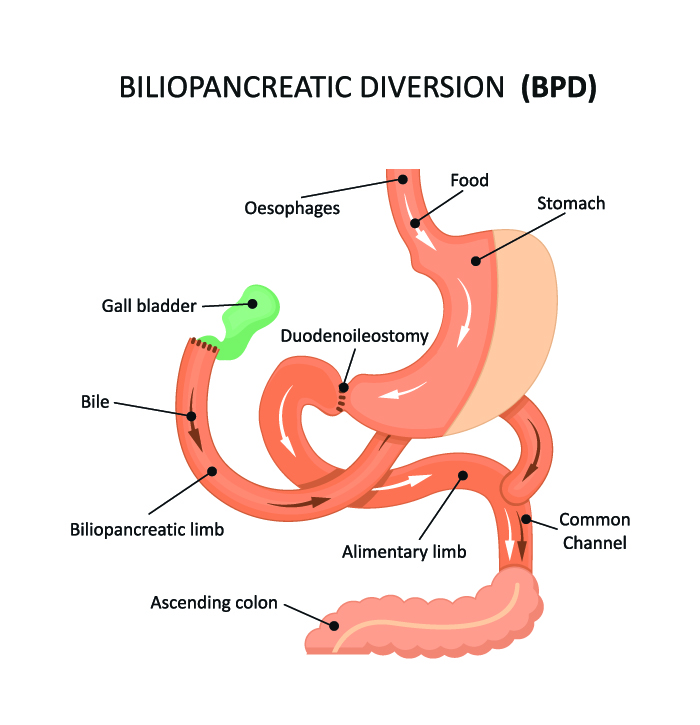Biliopancreatic Diversion Treatment & Diagnostics in Karol Bagh, Delhi
Biliopancreatic Diversion
Biliopancreatic diversion is a type of weight-loss surgery in which the normal digestive process is altered by making the stomach size smaller. As a result of this procedure, the food that you eat bypasses a part of the small intestine to ensure that you absorb less calories. The procedure is suggested to people who are severely obese or have a BMI of 50 or higher.
Once this surgery is performed, the patient feels full faster and consumes less food. Because of food bypassing some of the intestine, the patient ends up absorbing fewer calories as well. Due to this, he/she ends up losing weight.
To know more, contact a bariatric surgeon near you or visit a bariatric hospital near you.

What is biliopancreatic diversion?
Biliopancreatic diversion is of two types:
- Biliopancreatic diversion
- Biliopancreatic diversion with duodenal switch.
Duodenal switch is usually not performed except in cases of super obesity.
Biliopancreatic diversion involves removing a part of the stomach and connecting the remaining part with the lower end of the small intestine. During the procedure with duodenal switch, a different part of the stomach is cut out leaving the pylorus intact. This valve controls the drainage of food from the stomach. A part of the duodenum is then removed and attached to the bottom part of the small intestine. The entire passage is arranged so that the part where food and digestive juice mix remains quite short. The procedure can be done either as an open surgery or laparoscopically.
Who qualifies for biliopancreatic diversion surgery?
>
Any kind of weight-loss surgery is suitable only for severely obese people, especially those who have failed to lose weight using dietary charges, medicines and exercise. If you consult any bariatric surgeon near you, you will see that most surgeons do not perform duodenal switch unless the patient is super obese and suffering from serious health issues due to the excess weight.
It is important to keep in mind that biliopancreatic diversion surgery is a tool to help you with weight loss. It cannot be used as an instant fix. You will be required to continue exercising regularly and eating a healthy diet.
Why is biliopancreatic diversion performed?
This procedure is used to make the stomach smaller, just like in gastric bypass, but changes are also made in the small intestine to ensure that there is less absorption of food. This procedure changes the normal digestion process by making the food bypass a part of the small intestine. Just like gastric bypass, the patient undergoing this procedure suffers the risk of developing nutritional deficiencies.
This procedure is a lot less common than other bariatric surgeries because it requires long-term monitoring and extensive nutritional follow-up. If you are wondering if biliopancreatic diversion is the right choice for you, get in touch with a bariatric surgeon in New Delhi who can help you understand the pros and cons or whether you are eligible for the procedure.
Request an appointment at Apollo Spectra Hospitals, Karol Bagh, New Delhi.
Call 1860 500 2244 to book an appointment.
What are the biggest benefits of biliopancreatic diversion?
- The main benefit of biliopancreatic diversion surgery is that there is a lower risk of weight regain after the surgery.
- According to a number of clinical studies, patients have also witnessed resolution of hyperlipidemia, hypertension, type 2 diabetes and sleep apnea.
- Since the pyloric valve is preserved, patients undergoing the surgery don’t experience Dumping Syndrome, which is quite common with Roux-en-Y gastric bypass.
- The diet after biliopancreatic diversion is much more normal than that prescribed after other bariatric surgeries.
- The procedure helps eliminate stomach ulcers as well.
What are the possible complications?
- Malabsorption of nutrients is common with biliopancreatic diversion, the person undergoing the procedure needs to take mineral and vitamin supplements for life.
- Patients require extensive blood tests throughout their lives to check for mineral and vitamin deficiencies.
- Patients undergoing the procedure have higher chances of suffering from diarrhea and smelly flatus, though they can be controlled with the right diet.
If you work in an office, you will need a few weeks away from work. However, if you are involved in a manual job, you are looking at a longer span away from work.
Eat a diet rich in proteins with very little fat and moderate carbohydrates after the procedure. Since there is no risk of ‘dumping syndrome’, you can also consume sugar in moderation. A dietitian at your bariatric surgery hospital in New Delhi will be able to guide you appropriately.
You can eat normal-sized portions after biliopancreatic diversion surgery. However, if you regularly eat more calories than you burn off, you will regain weight. So, make sure that you have a sensible diet and indulge in regular exercise.
Our Top Specialities
NOTICE BOARD
CONTACT US
CONTACT US
 Book Appointment
Book Appointment


.svg)
.svg)
.svg)
.svg)








